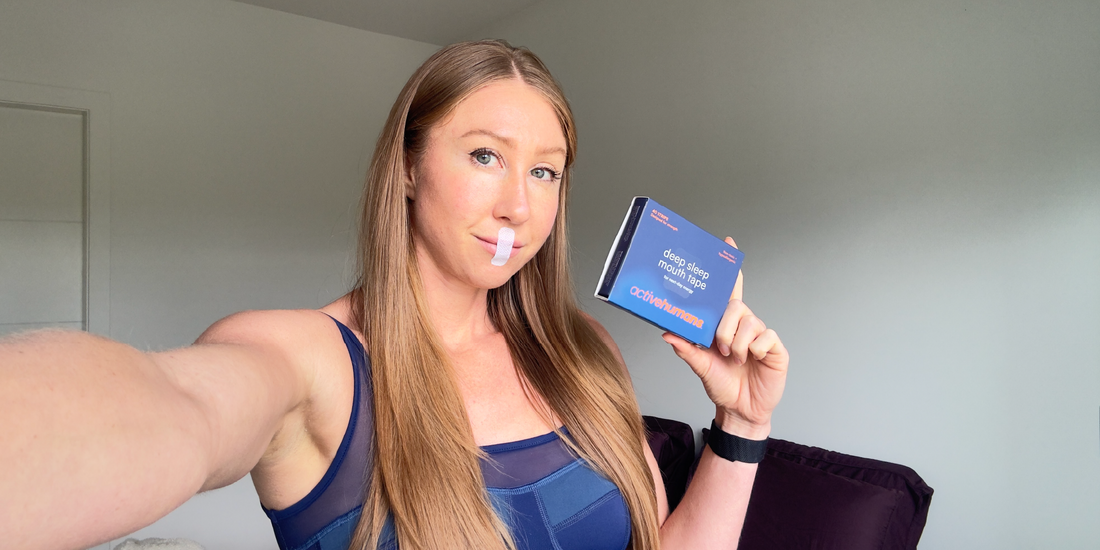
As a health coach and self-proclaimed wellness weirdo, I was frustrated — why couldn’t I fix my own sleep?
For years, I woke up with headaches, jaw tension (I literally had to massage it every morning), bad breath, grogginess, and that lingering low-energy, anxious feeling I couldn’t shake. And like any overthinking wellness girlie, I had a full diagnosis dialogue playing on repeat in my head:
- “Maybe I have a histamine intolerance — I’ll skip eggs today.”
- “I knew I shouldn’t have eaten gluten last night.”
- “I’m definitely dehydrated, even though I swear I had electrolytes?”
- “My oral microbiome must be off… probably gut-related.”
- “Those cracks of light through my blinds are definitely ruining my melatonin.”
- “Should I double my magnesium again?”
Totally normal internal banter… at 7 a.m 😋
Despite eating well, winding down, taking my supplements I still felt off. I knew I was missing something — and I was. Turns out, I was a major mouth breather while I slept. And that was the game-changer.
Why mouth breathing was ruining my sleep
While sleeping, my mouth would fall open. And even though this sounds harmless, mouth breathing at night is a suboptimal way for our bodies to get oxygen. It disrupts your nervous system, impacts sleep quality, and can lead to a long list of symptoms — the very ones I was waking up with.
On the other hand, nasal breathing (breathing through your nose) is your body’s preferred method. It supports deeper sleep, better oxygenation, improved oral health, reduced inflammation, and even better cognitive and athletic performance. Wild, right?
So I tried the simplest tool ever: mouth tape.
My first night of mouth taping changed everything
I taped my mouth shut before bed (yes, it felt weird at first) — and I woke up a different person.
No headache. No jaw tension. I felt calm, rested, and actually excited to get out of bed. It was the deepest, most restorative sleep I’d had in years. Out of the 200 wellness habits I’d tried to feel better in the morning, this tiny shift made the biggest impact. Mind. Blown. 🤯
That was two years ago — and I haven’t slept a night without mouth tape since.
Could you be a mouth breather too?
If you wake up feeling groggy, tense, or unrested even after a full night of sleep, you might be like me. Mouth breathing during sleep can contribute to:
- Snoring or mild sleep apnea
- Jaw tension or TMJ
- Headaches or migraines
- Dry mouth and bad breath
- Low energy and fatigue
- Poor focus and brain fog
- Feelings of stress or anxiety
- Frequent wake-ups throughout the night
A tape or in our case a Strip or Mini Strip, was the key to a major sleep shift.
Switching from mouth to nasal breathing while you sleep can completely transform how you feel in the morning. It changed my life — and that’s why we created activehumans deep sleep mouth tape for next day energy.
We designed two styles:
The STRIP – Strong, secure and supportive. Designed for all users, especially heavy mouth breathers
The MINI STRIP – Minimal, gentle, and comfortable. Designed for more advanced users or a gentle reminder to close your mouth
Both are made to help you restore your natural breath, reconnect to deep sleep, and wake up with more energy than coffee can offer. Learn more about our deep sleep mouth tape or try the 10-night starter pack here!
🌙 Tonight’s deep sleep tip
If you’re waking up tired, don’t just look at what you’re eating or supplementing — pay attention to how you’re breathing. Try mouth taping and experience what it’s like to actually rest and recover overnight.
rest easy, rise ready.
Paige Alexandra
Founder @iampaigealexandra


